
Serbia
For a full scale picture, please click on the picture shown !

This is the most modern train of Serbian railways, taken in use during the spring of 2022. It is a Swiss Stadler KISS doubledecker
built for long distance trips. Currently these "SOKO" trains are used in intercity type of traffic between Belgrad and
Novy Sad.
Picture from the new and as yet unfinished station of Belgrad by Markku Salo.
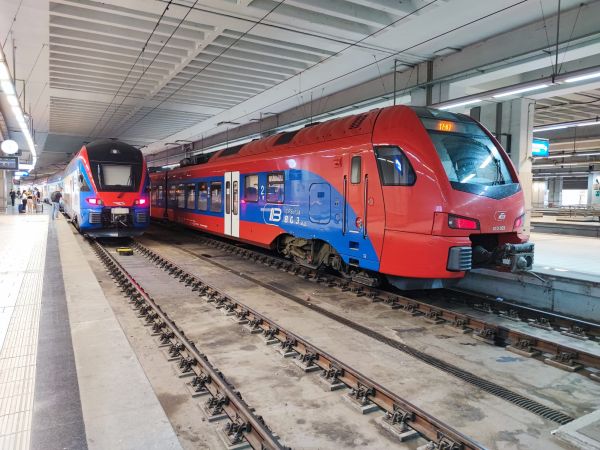
Two of the newest train types of Serbian railways, both built by the Swiss company Stadler. On the right, Serbian class 413, which is
a Stadler FLIRT regional train. On the left, the front of the "SOKO" or Stadler KISS, Serbian class 410.
Picture from the new and as yet unfinished station of Belgrad by Markku Salo.
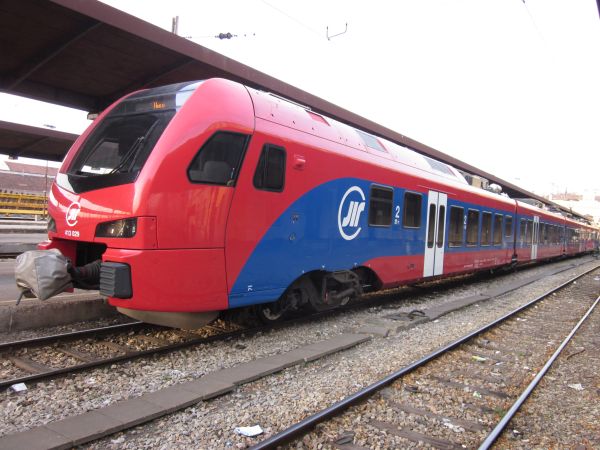
One of the most modern parts of the Serbian Railways, "Železnice Srbije" is this Swiss made class 413 Stadler FLIRT.
Picture from Belgrad main station in 4.12.2016 by Jaakko Riihimaa.
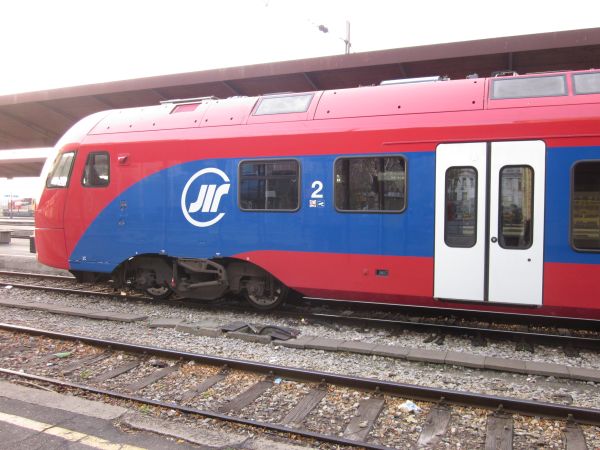
Closeup of the front of the same FLIRT train. Serbian Railways ordered from the Swiss company Stadler Rail in 2013 21 of these four coach
electric multiple units. They are intended for suburban services in the Belgrade city area. Picture from Belgrade main station
4.12.2016 by Jaakko Riihimaa.
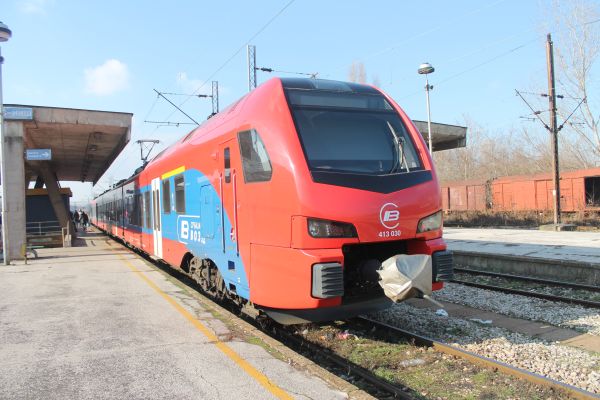
Another class 413 FLIRT, this time at the station of Niš. Picture 30.12.2017 by Timo Varshukov.
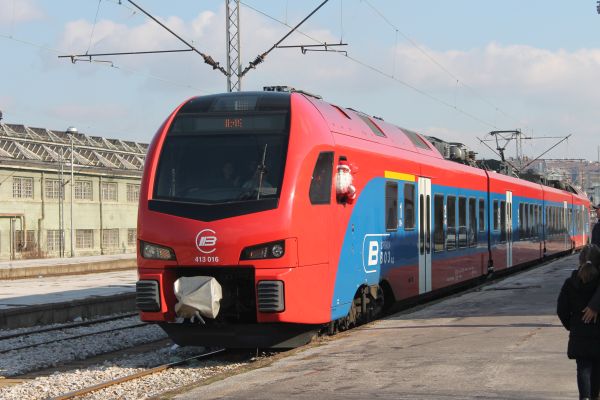
Santa Claus as the driver, this class 413 FLIRT brought in a crowd of happy children and adults from a Santa's special train ride to the station of Niš.
Picture 30.12.2017 by Timo Varshukov.
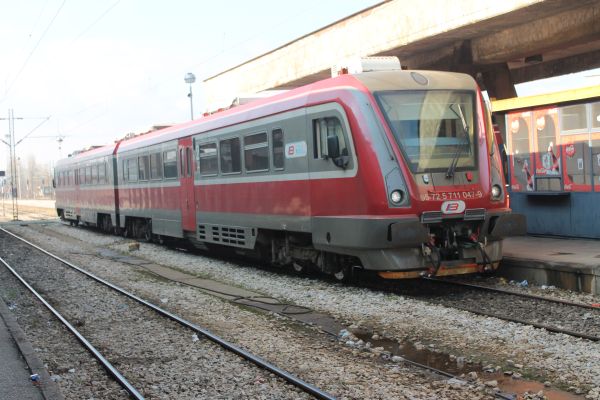
A class 711 railbus of Serbian railways at the station of Niš. The class 711 is made in Russia and it is known in Russia as the RA2.
The type is in use by Russian railways, Ulanbaatar Railbus, Lithuanian Railways and Serbian Railways. It is built by Metrowagonmash
in Russia since 2005. It has two Cummins or Russian YaMZ diesel engines, 350 kW each.
Picture at Niš 30.12.2017 by Timo Varshukov.
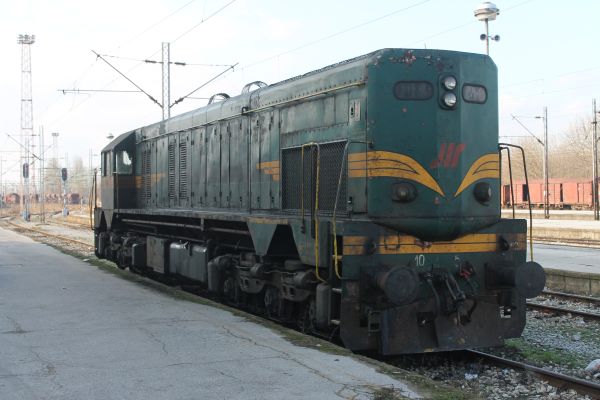
This is an old, originally American diesel. It is a Serbian railways class 661. USA sold these EMD G16 machines nicknamed "Kenedi" to what then
was Yugoslavia and this was one of the most used diesel locomotives in the country. When Yugoslavia broke up, the machines were divided amongst the
newly born nations. For more pictures of these machines, see for example the Slovenian section of this picture archive. This individual still
carries the old Yugoslav Railways colours and markings as well as the old class number 661. It has merely gotten a new red logo at its front.
Picture at Niš 30.12.2017 by Timo Varshukov.
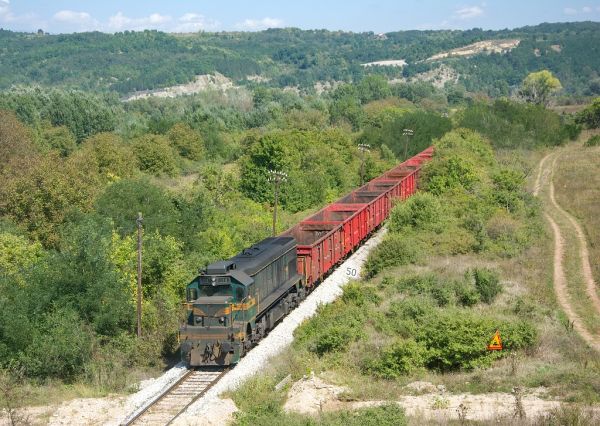
A similar old class 661 diesel with open wagons used for transportation of copper ore.
Picture from the line between Ciflik and Crkvica 8.9.2022 by Petr Štefek.
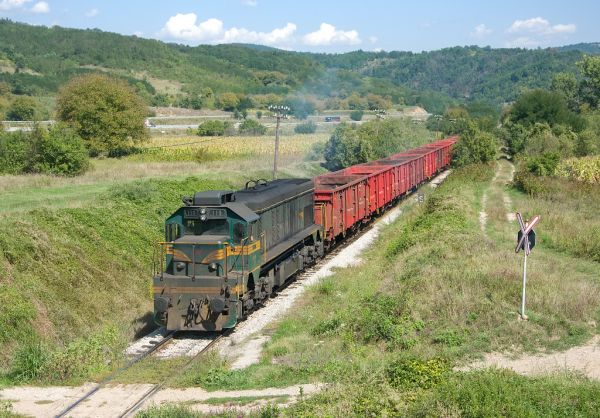
The same old class 661 diesel as above, here approaching a road crossing at Sinjac on the line between Ciflik and Crkvica.
Picture 8.9.2022 by Petr Štefek.
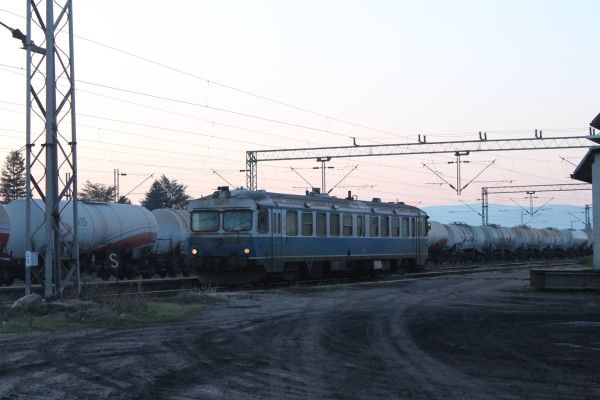
These Y1 railbuses used to be Swedish. They were built for the Swedish state railways SJ 1979-81 by Fiat Ferroviaria and Kalmar
industries. The railbus is based on the Fiat ALn668 railbuses delivered for the Italian state railways FS, although they received
a new chassis. They were quite lousy machines until the Swedes took out Italian engines and replaced them with Volvo truck/bus
engines, thus creating a fairly good quality product. When the Swedes eventually did not any more need all of these, many Y1 railbuses
were sold. They are now used not only in Sweden, but also in Norway, Serbia, Croatia, Kosovo and Uruguay. Here we see one of them
as Železnice Srbije (Serbian state railways) class 710. Picture from Niš, Serbia 11.1.2018 by Timo Varshukov.
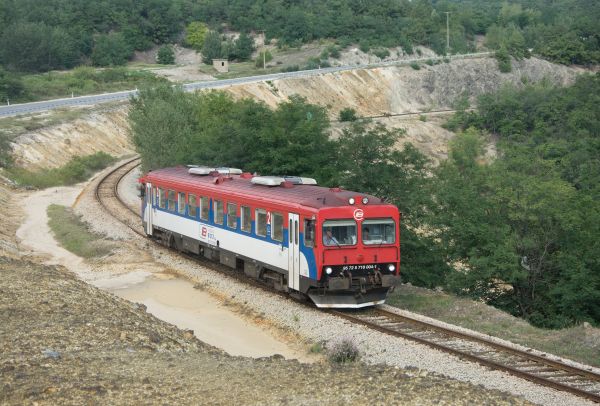
Another former Swedish Y1 railbus, now Serbian Railways class 710, seen here between Borska Slatina and Bor Teretna.
Picture 6.9.2022 by Petr Štefek.
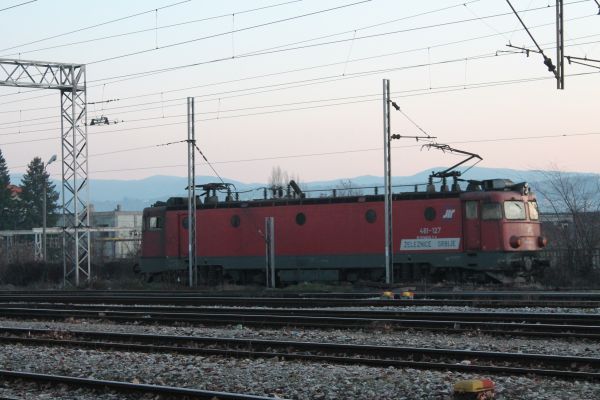
A Serbian Railways class 461 electric locomotive. These machines were built for Yugoslav Railways in Romania by Electroputere Craiova,
but the type is originally Swedish. It used to be called series EA or in Norway as El15. For Yugoslavia these were built in two series
1971 to 1980. It is a six axle machine built for 25 kV AC and its top speed is 125 km/h. Its nickname is Rumunka (Romanian girl).
Picture from Niš, Serbia 11.1.2018 by Timo Varshukov.
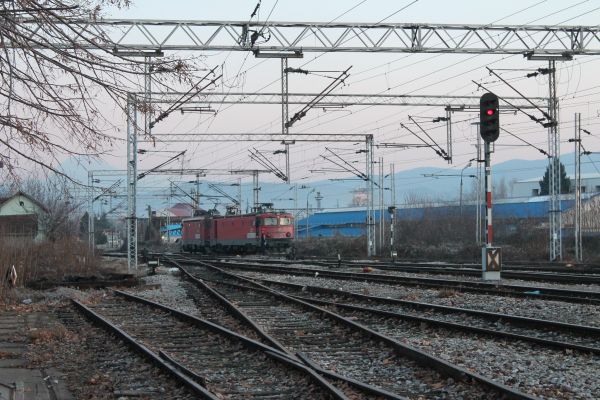
Two Serbian Railways electric locomotives. The bigger one on the right is the same class 461 as in the picture above. The one on
the left is a four axle class 441 locomotive. Also the 441 is based on a Swedish design by ASEA, but these Yugoslavian machines were
built on ASEA's license by Končar Group, TŽV Janko Gredelj, Đuro Đaković and MIN Niš in 1968-87. For a better picture of such a
locomotive, see our Slovenian section.
Picture from Niš, Serbia 11.1.2018 by Timo Varshukov.
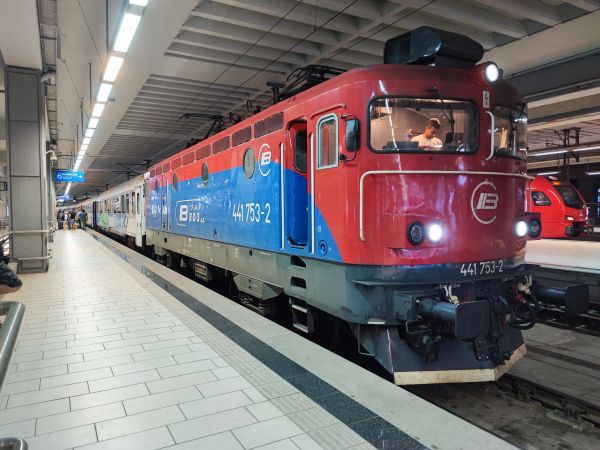
A closer look of one of Serbian railways class 441 locomotives. These machines were built by two factories, Končar of Croatia and MIN Niš
of Serbia 1968 to 1988. The machine is based on a Swedish design. Here we see the locomotive in the newest livery of Serbian Railways.
Picture from Beograd Centar railway station, Belgrade, 10.6.2022 by Markku Salo.
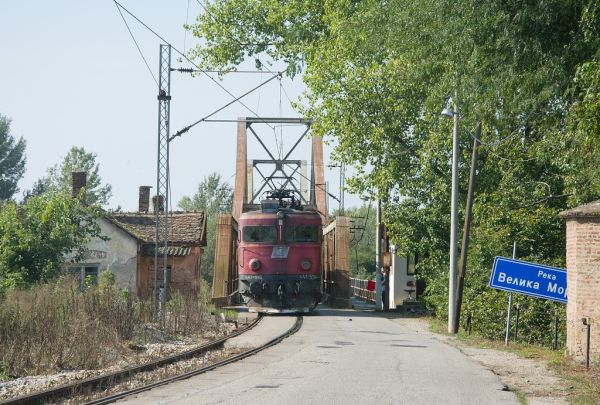
A Serbian railways class 441 locomotive is meeting car traffic on a narrow bridge.
Picture from Lubicevski Most 6.9.2022 by Petr Štefek.
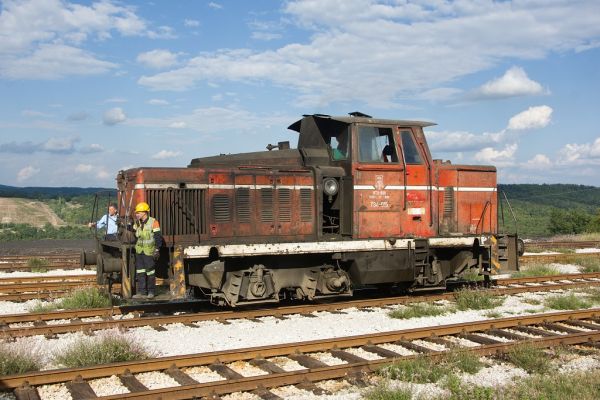
A Serbian railways class 734 diesel shunter.
Picture from Bor Teretna 6.9.2022 by Petr Štefek.
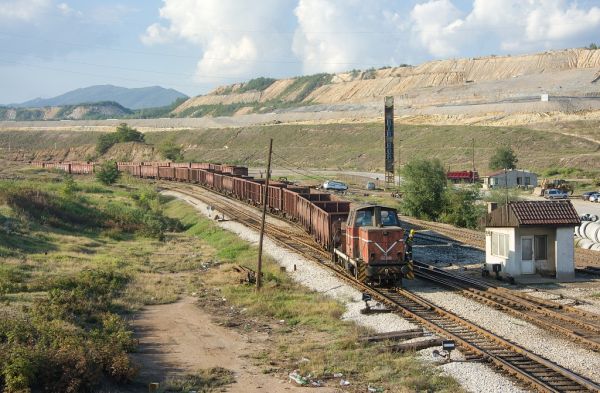
The same Serbian railways class 734 diesel shunter as shown above, here shunting empty wagons at the Serbia Zijin Bor Copper mines.
Class 734 was built by MIN (Mechanical Industry Niš) as their type DHL-600.
Picture from Bor Teretna 6.9.2022 by Petr Štefek.
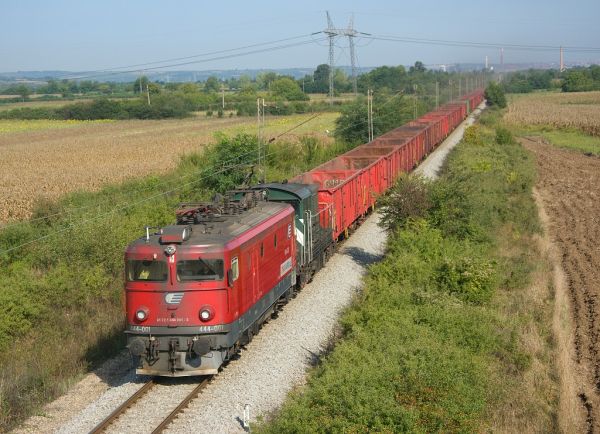
An empty coal train of the Serbian state railways cargo Srbija Kargo consisting of a class 444 electric locomotive and a
small diesel of the class 641. The class 444 was built by the companies KONČAR and MIN Niš 2004-2007. 30 machines were built and 23 remained in service
in 2022. The machine is a 3.800 kW machine with a top speed of 120 km/h.
Picture from the line between Skobalj and Osipaonica staj 6.9.2022 by Petr Štefek.
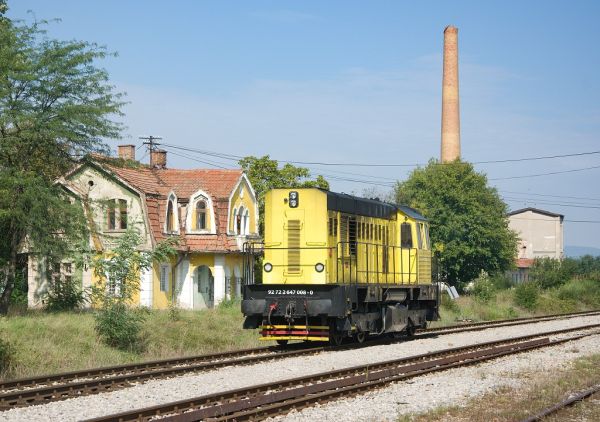
Serbian railways class 647 shunter is an old Czech machine that used to be Czech class 740 or CKD T448.
Picture from Sukovo in Serbia 8.9.2022 by Petr Štefek.
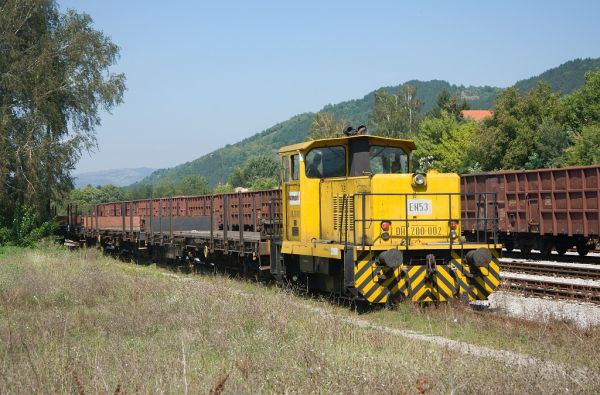
This small shunter EN53 is owned by the private company TIGAR. It has been made by the company MIN (Mechanical Industry Niš) as their type
DHL-200.
Picture from Pirot, Serbia 8.9.2022 by Petr Štefek.
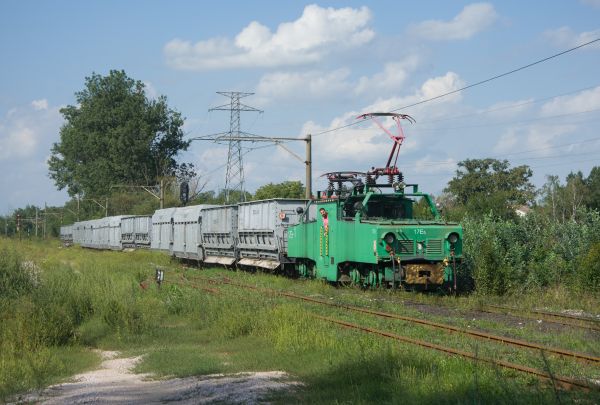
This incredibly strong but slow mine locomotive of the type 17E was produced in the old communist times in Czechoslovakia by Škoda. It's a narrow gauge
machine specially designed for pulling extremely heavy loads out of coal mines and other mines onto the ground.
Picture from the Kolubara coal mines 9.9.2022 by Petr Štefek.
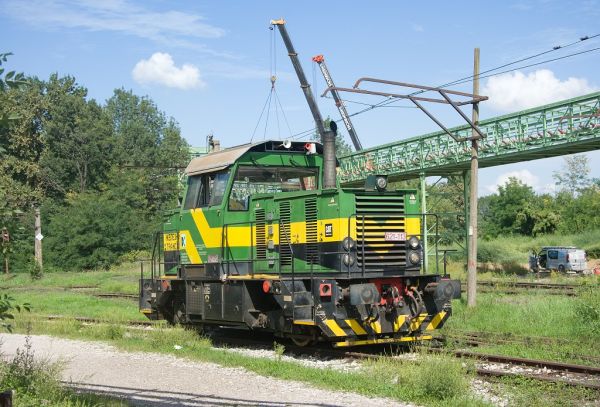
This class 621 shunting locomotive is of a new type built in the Czech republic 2002-2006 by ČMKS. They have been bought to Serbia in three batches
and also the Kolubara mine fields purchased their own class 621 locomotives for light weight coal trains.
Picture from the Kolubara coal mines 9.9.2022 by Petr Štefek.
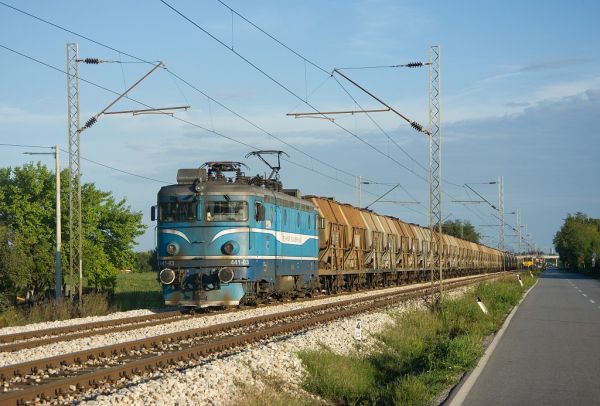
A class 441 locomotive of TENT hauling a heavy coal train. TENT is a Serbian state owned company operating a huge power plant some 40 km from downtown
Belgrade.
Picture from the line between Brgule and Stubline 9.9.2022 by Petr Štefek.
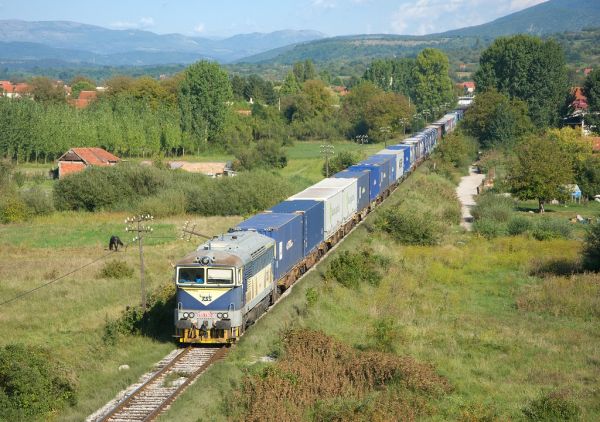
A class 753 diesel nicknamed "goggles" is here a visitor from Czech Republic to Serbia. Here we se it with a container train on the line
between Bela Palanka and Belanovac in Serbia 7.9.2022. Picture by Petr Štefek.
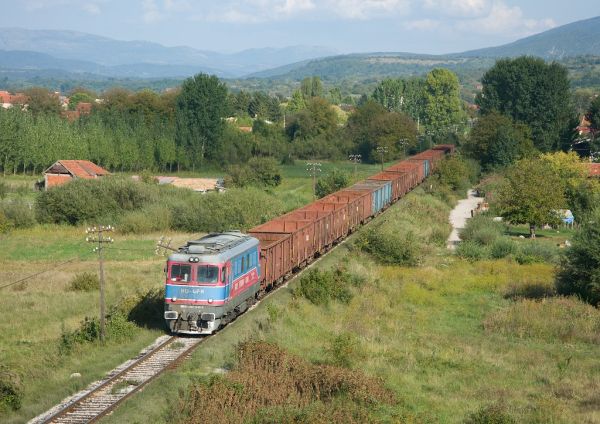
Another foreign visitor exactly at the same place than in the picture above. This is a class 060-DA diesel of the Romanian GFR, Grup Feroviar Român,
the national railways of Romania. The type 060-DA was originally designed in Switzerland and they have lately been in use in several countries including
Romania, Serbia, Poland, Germany and others.
Picture from the line between Bela Palanka and Belanovac in Serbia 8.9.2022. Picture by Petr Štefek.
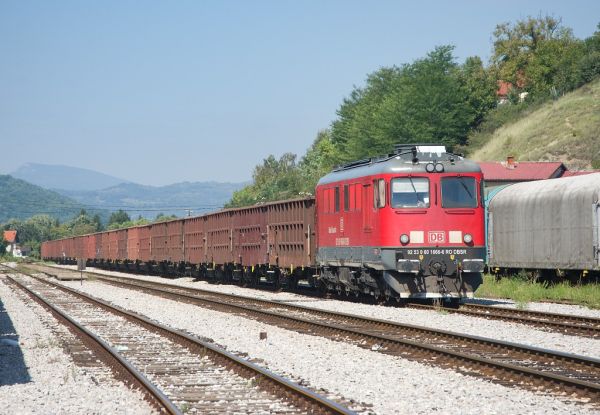
A similar class 060-DA diesel than in the picture above, but this one is owned by the DB Schenker Romania (DB Cargo Romania), a Romanian daughter
company of Deutsche Bahn DB.
Picture from Pirot, Serbia 8.9.2022 by Petr Štefek.
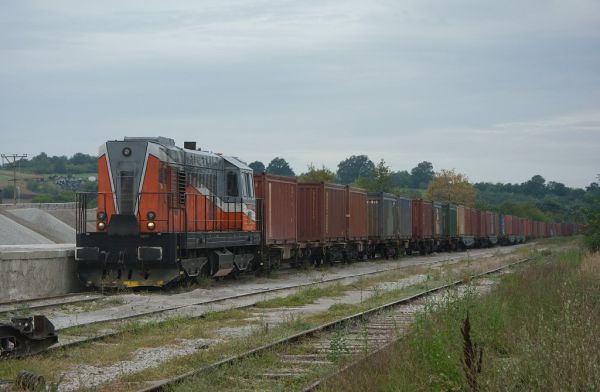
This is an old class 648 diesel from the Czech republic, but now working for the mining industry in Despotovac, roughly 130km south of the Serbian
capital. Mining is the most important source of work in the area.
Picture from Despotovac, Serbia 9.9.2022 by Petr Štefek.
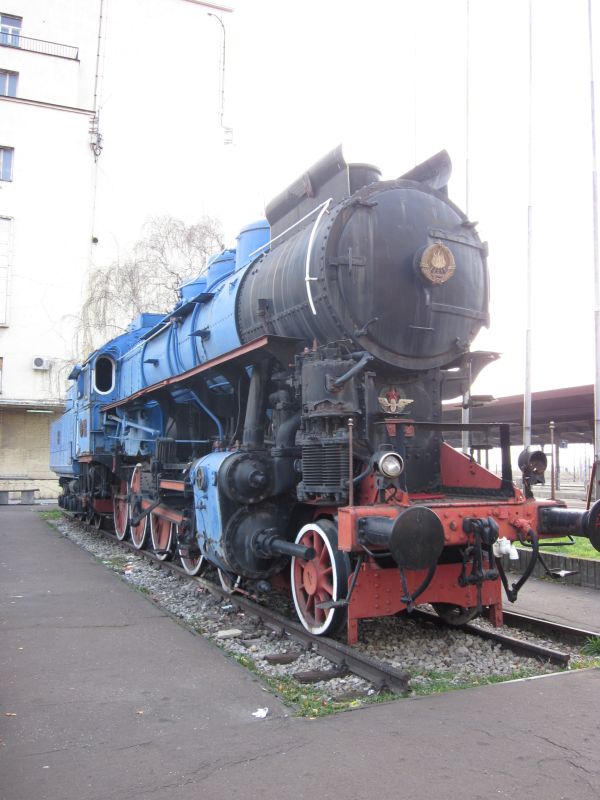
Old monument from the communist times. This is a former Yugoslav Railways JŽ class 11 steam locomotive with 4-8-0 wheels.
These machines were built in Hungary between 1924 and 1958 and they were used in addition to Hungary and Yugoslavia also in
the Soviet Union and North Korea. Picture from Belgrade main station 4.12.2016 by Jaakko Riihimaa.
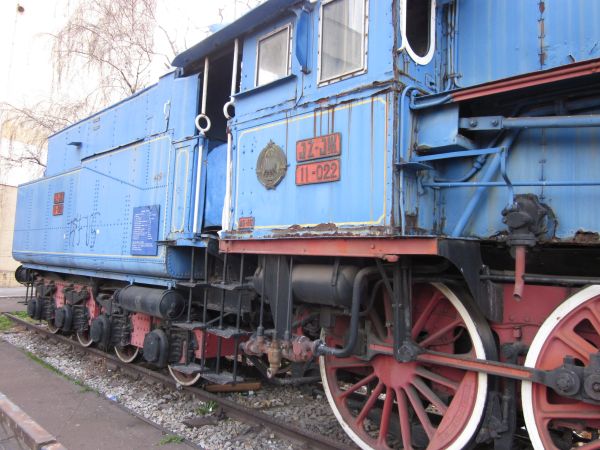
A closeup of the same class 11 steam locomotive as above. Picture from Belgrade main station 4.12.2016 by Jaakko Riihimaa.

